
Is That All You Got?
“The time may have come to say good-bye to Muhammad Ali. Because, very honestly, I don’t think he can beat George Foreman,” Howard Cosell.
But we all know that Cosell was wrong. After eight rounds of utilizing the rope-a-dope tactic, accepting the punishment of Foreman’s legendary heavy fists in order to tire out the heavily favored champion, Muhammad Ali knocked George Foreman out at the end of the eighth round. He was only the second boxer to regain the Heavyweight title.
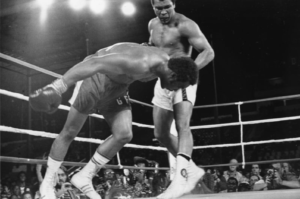
“What I remember most about the fight was I went out and hit Muhammad with the hardest shot to the body I ever delivered to any opponent. Anybody else in the world would have crumbled. Muhammad cringed; I could see it hurt. And then he looked at me. He had that look in his eyes, like he was saying, I’m not going to let you hurt me,” said George Foreman. Nor did Ali stop there – as the blows rained against him he would taunt Foreman; in whispers and in shouts, “Is that all you got?”
The Rumble in the Jungle, as the fight would be called, happened against all odds. The organizer, Don King, didn’t have the experience to pull off such an event. Nor did he have the funding – King promised 5 million dollars to the fighters. Pulling off the event in the United States was not a possibility.
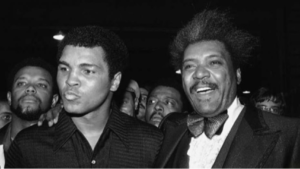
In stepped an elusive American advisor to the Zairean dictator Mobutu Sese Seko, Fred Wyman, who saw such an all-star event as a springboard to prominence for the African nation. With the agreement of the dictator of Zaire and the funding of the prize purse by Libyan Dictator Muammar Gaddafi, the most famous fight in boxing history was set.
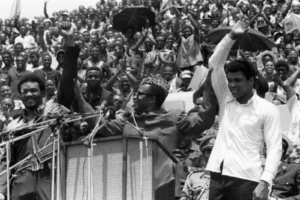
Things did not go smoothly. King set the event with a “Back to Africa” theme and included a three day music festival. Early posters tagged the fight, “From Slave Ship to Championship,” although new posters were ordered when an uproar ensued. Now iconic, the official posters mimicked the colors of the flag of Zaire, eye arresting green and yellow. The French version included the statement, “Un cadeau du President Mobutu au peuple Zairos et un honneur pour l’homme noir,” (A gift from President Mobutu to the people of Zaire and an honor for the black man).
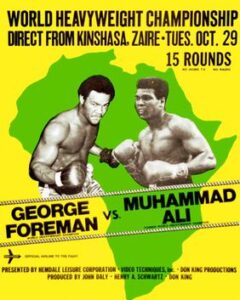
Although it was never officially admitted, it was rumored that in a bid to crush the crime in Kinshasa and make a positive impression on international audiences and attendees, President Mobutu rounded up 1000 of the leading criminals in Kinshasa before the fight, imprisoning them under the Stade du 20 Mai and shooting 100 preemptively to serve as an example. The city was crime-free for the event.
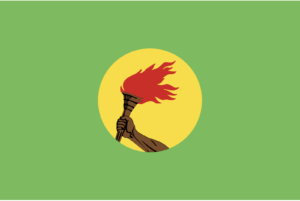
Nor was preemptive execution and imprisonment the most outlandish of the things done by Mobutu before the fight – at one point he gifted the daughter of George Foreman a baby lion.
Although the heavy-hitting Foreman was a 7-1 favorite to win, Ali was the favorite personality in Africa. Foreman stepped off the plane with his two German Shepherd dogs, the same breed used to subdue the Congolese under Belgian rule, and then retreated to his rooms at the Intercontinental Hotel. Ali stayed in a villa in the city, often allowing locals to watch him train and hear him speak. His conviction for refusing to enter military service under the draft in 1967 made him a symbol of resistance to American power in a country that was a Cold War proxy battlefield.
Ali remained the local favorite even after making verbal gaffes like, “My people! My people gonna put George Foreman in a pot and cook him!“
The entire project was nearly derailed eight days before the 25 September scheduled fight when a misplaced elbow during a training session caught Foreman above the eye and required 11 stitches. President Mobutu, convinced that this was a ploy for the American fighters to run off with his money, wanted them placed under house arrest. But the fight was rescheduled for 30 October, and there would be no further delays.
There would still, however, be hiccups. The oppressive heat and humidity of Kinshasa rotted the foam coverings of the boxing ring and it half-sank into the mud of the stadium field. The cleaners had removed all the rosin from the floor canvas, thinking it was dirt.
It was left to Ali’s team to figure out a way to fix the ring in time for the 4 am bout. They cut the ropes and tightened them – although considerable slack was still left (all the better for a fighter utilizing rope-a-dope).
Foreman demanded payment for his next fight before the Rumble in the Jungle even took place.
And the entire event was nearly overshadowed by three narcissistic journalists; Hunter S. Thompson, George Plimpton, and Norman Mailer. Thompson was obsessed with the idea of Hitler Henchman Martin Borman hiding in the Zairean jungle, purchasing ivory elephant tusks, and didn’t even attend the fight. Mailer used the opportunity to wax on about Black history and Bantu philosophy through a racial lens that sounded even more egregiously racist for trying to prove it wasn’t racism.
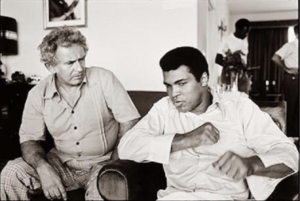
The fight took place on the new schedule, at four in the morning in order to accommodate the most lucrative contract of all – the pay-per-view allowing more than 1 billion people around the world to witness the historic event. The 60,000 people in Kinshasa’s stadium roared as Ali’s personal drummer beat his drum each time a punch landed on Foreman. And when Foreman fell, they surged forward.
An hour after the fight ended, the delayed rainy season burst from the skies, flooding the venue. Later that afternoon Ali would be found in front of his Kinshasa villa, doing rope tricks with the local children.
Ali would hold the title until his 1978 fight with Leon Spinks, and would briefly regain it one more time – a three time heavyweight champion. Foreman would return from retirement to win the title a second time – at age 45, wearing the same trunks he had worn twenty years later in Kinshasa.
- October 30, 2020
- Uncategorized
